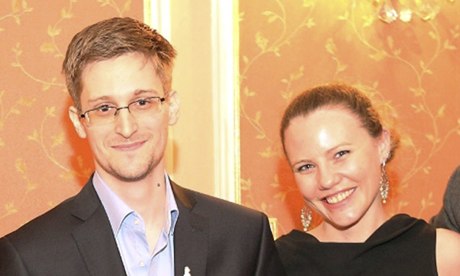- [en] Statement by Sarah Harrison
- [de] Erklärung von Sarah Harrison
- [es] Declaración a la prensa de periodista Sarah Harrison sobre Edward Snowden
- [fr] Déclaration de la journaliste de Wikileaks Sarah Harrison au sujet d'Edward Snowden

As a journalist I have spent the last four months with NSA whistleblower Edward Snowden and arrived in Germany over the weekend. I worked in Hong Kong as part of the WikiLeaks team that brokered a number of asylum offers for Snowden and negotiated his safe exit from Hong Kong to take up his legal right to seek asylum. I was travelling with him on our way to Latin America when the United States revoked his passport, stranding him in Russia. For the next 39 days I remained with him in the transit zone of Moscow's Sheremetyevo airport, where I assisted in his legal application to 21 countries for asylum, including Germany, successfully securing his asylum in Russia despite substantial pressure by the United States. I then remained with him until our team was confident that he had established himself and was free from the interference of any government.
Whilst Edward Snowden is safe and protected until his asylum visa is due to be renewed in nine months' time, there is still much work to be done. The battle Snowden joined against state surveillance and for government transparency is one that WikiLeaks – and many others – have been fighting, and will continue to fight.
WikiLeaks' battles are many: we fight against unaccountable power and government secrecy, publishing analysis and documents for all affected and to forever provide the public with the history that is theirs. For this, we are fighting legal cases in many jurisdictions and face an unprecedented Grand Jury investigation in the United States. WikiLeaks continues to fight for the protection of sources. We have won the battle for Snowden's immediate future, but the broader war continues.
Already, in the few days I have spent in Germany, it is heartening to see the people joining together and calling for their government to do what must be done – to investigate NSA spying revelations, and to offer Edward Snowden asylum. The United States should no longer be able to continue spying on every person around the globe, or persecuting those that speak the truth.
Snowden is currently safe in Russia, but there are whistleblowers and sources to whom this does not apply. Chelsea Manning has been subject to abusive treatment by the United States government and is currently serving a 35-year sentence for exposing the true nature of war. Jeremy Hammond is facing a decade in a New York jail for allegedly providing journalists with documents that exposed corporate surveillance. I hope I have shown a counter example: with the right assistance whistleblowers can speak the truth and keep their liberty.
Aggressive tactics are being used against journalists, publishers and experts who work so courageously to bring truth to the world. Glenn Greenwald, Laura Poitras and Jacob Appelbaum are all in effective exile. Barrett Brown is indicted for reporting on unethical surveillance practices. My editor Julian Assange has asylum over US threats, but the United Kingdom refuses to allow him to fully exercise this right, violating the law. The UK government also detained David Miranda under the UK Terrorism Act for collaborating with Laura Poitras and Glenn Greenwald.
The UK Terrorism Act defines terrorism as the action or threat of action "designed to influence" any government "for the purpose of promoting a political or ideological cause". It prescribes actions that interfere with the functioning of an "electronic system" (i.e. the NSA's bulk spying program) or which the government alleges create a "risk" to a section of the public. It should be fanciful to suggest that national security journalism which has the purpose of producing honest government or enforcing basic privacy rights should be called "terrorism", but that is how the UK is choosing to interpret this law. Almost every story published on the GCHQ and NSA bulk spying programs falls under the UK government's interpretation of the word "terrorism". In response, our lawyers have advised me that it is not safe to return home.
The job of the press is to speak truth to power. And yet for doing our job we are persecuted. I say that these aggressive and illegal tactics to silence us – inventing arbitrary legal interpretations, over-zealous charges and disproportionate sentences – must not be permitted to succeed. I stand in solidarity with all those intimidated and persecuted for bringing the truth to the public.
In these times of secrecy and abuse of power there is only one solution – transparency. If our governments are so compromised that they will not tell us the truth, then we must step forward to grasp it. Provided with the unequivocal proof of primary source documents people can fight back. If our governments will not give this information to us, then we must take it for ourselves.
When whistleblowers come forward we need to fight for them, so others will be encouraged. When they are gagged, we must be their voice. When they are hunted, we must be their shield. When they are locked away, we must free them. Giving us the truth is not a crime. This is our data, our information, our history. We must fight to own it.
Courage is contagious.
Sarah Harrison, Wednesday 6 November 2013, Berlin
WikiLeaks
Legal Defence Fund
Journalistic Source Protection Defence Fund
Images of Sarah Harrison